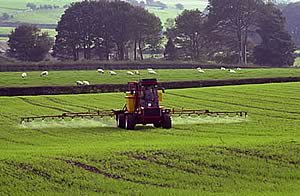 |
|||||||||
|
|||||||||||||||||||
Arable
Units Face Acute Autumn Weed Control Dilemma Arable units across the country are facing an acute dilemma in
their autumn weed control programmes as a direct result of increasing
time pressures, reveals a national survey of growers responsible
for nearly 125,000 ha of UK cropping.
Some 99% of the 200 growers involved in the survey conducted by
Monsanto over the past month consider it vital to achieve the best
possible seedbed weed control. Yet 87% say they have less time
than ever between harvesting and autumn drilling, and 86% are finding
the summer and autumn weather more variable than it used to be. Not surprisingly under these circumstances, 99% of the growers
questioned stress they need herbicides they can rely on to perform
even if conditions are less than ideal. “This where modern Roundup formulations based on the latest
patented surfactant technology really score. They’re rainfast
in just one hour on annual weeds and common couch compared with
6 hours (preferably 24) with ordinary glyphosates. They’re
proven to give 20% better control of weeds under hot, dry conditions
and 10% better across-the-board control of tough perennials. And
they allow cultivation after only six hours compared to a minimum
of 24 hours.
|
|||||||||||||||||||

|
|
||||||||||||||||||
| home | agri-services | pedigree
pen | news | dairy | beef | machinery property | organisations | site map |
|||||||||||||||||||

